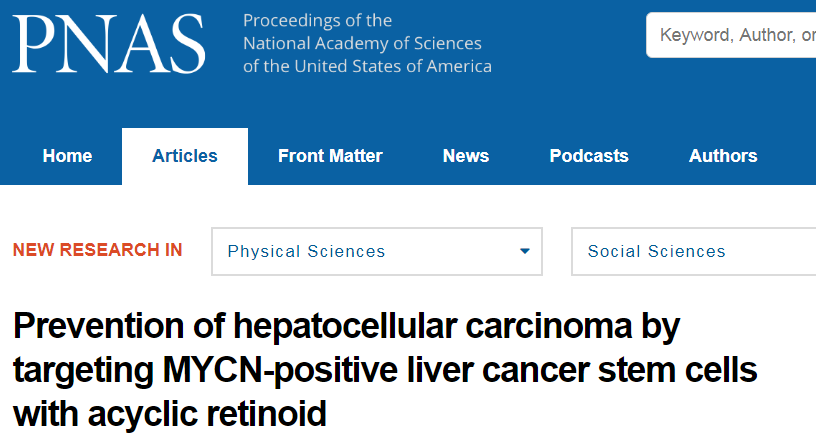New evidence for cancer! Vitamin A Derivatives Kill Cancer Stem Cells | PNAS
April 25, 2018 Source: Biological Exploration
Window._bd_share_config={ "common":{ "bdSnsKey":{ },"bdText":"","bdMini":"2","bdMiniList":false,"bdPic":"","bdStyle":" 0","bdSize":"16"},"share":{ }};with(document)0[(getElementsByTagName('head')[0]||body).appendChild(createElement('script')) .src='http://bdimg.share.baidu.com/static/api/js/share.js?v=89860593.js?cdnversion='+~(-new Date()/36e5)];
Image source: PNAS ( https://doi.org/10.1073/pnas.1802279115)
Hepatocellular carcinoma is a highly lethal cancer that kills approximately 60 million people worldwide each year, making it the second most deadly cancer after non-small cell lung cancer. High recurrence rates are one of the most fatal causes of hepatocellular carcinoma (surgery and other therapies are initially effective, but then cancers tend to recur), so scientists are always looking for ways to prevent recurrence. Recent studies have confirmed that acyclic retinoid (also known as Peretinoin) is effective in this regard, but it is still unclear why it works.
Key gene MYCN
To find clues, the team led by Soichi Kojima first investigated the transcriptome of cells that had been exposed to acyclic retinoid and found that it was exposed compared to untreated cells in the control group. The expression of MYCN, a gene often expressed in tumors that is associated with poor prognosis, is low in cells of acyclic retinoid.
Further experiments have shown that decreased expression of MYCN leads to cell cycle progression, cell proliferation and colony formation slowdown and increased cell death, which means that the effect of acyclic retinoid on MYCN slows tumor growth.
Cancer stem cell
Next, the research team began investigating the role of a particular cell. The cell, called "cancer stem cells," survives the attack of chemotherapy or other therapies and then differentiates into new cancer cells, causing cancer to recur.
Studies have shown that high expression of MYCN is indeed associated with "expression of multiple markers associated with cancer stem cells." The scientists also found that when exposed to acyclic retinoids, a specific set of EpCAM-positive cancer stem cells were selectively depleted in a dose-dependent manner.
To test whether the study was clinically meaningful, Kojima et al. obtained liver biopsies from patients who received acyclic retinoid therapy after surgery and found that 6 patients received high-dose (600 mg/d) acyclic retinoid therapy. Among the patients, 4 people had decreased levels of MYCN expression. Finally, the scientists also investigated data from the Cancer Genome Atlas and found that high expression of MYCN is associated with a significant poor prognosis.
Phase 3 clinical trial
It is reported that a phase 3 clinical trial to test the ability of acyclic retinoid to prevent recurrence of hepatocellular carcinoma is currently underway in South Korea, Taiwan, and Singapore.
“Obviously, acyclic retinoids can target a class of cancer stem cells. This provides important information for us to reduce cancer recurrence and truly cure patients. We are waiting to see what future clinical data can show us.†Kojima concludes .
Reference materials:
Vitamin A derivative selectively kills liver cancer stem cells
Guangzhou Zhongzhinan Supply Chain Co.,Ltd. , https://www.zhongzhinanlighting.com